Introduction
Small businesses are at the heart of the Coronavirus pandemic, with Government’s and local authorities forced to step in to save the futures of thousands of firms and millions of jobs through grants, loans and furloughs. FSB’s own research found that by the end of April 2020, 41 per cent of small firms had temporarily closed, while the ONS found that those businesses still trading, 24 per cent reported their turnover had decreased by more than 50 per cent.
However, despite these incredibly difficult times for many, with hugely uncertain futures ahead the resilience of the country’s 5.8 million small businesses has never been more on display than it has during this pandemic.
Countless small businesses are coming forwards to help each other, engaging in their local communities and doing their bit to get through to the other side of the crisis. Even before the country started shutting down, FSB research had found that 80 per cent of small firms volunteered and/or contributed to a local community organisation or charitable cause.
The acts of kindness on the part of small businesses are perhaps the most common stories emerging from all parts of the country. Small businesses in towns, cities and rural areas have been innovating and reinventing themselves in order to survive as well as helping their communities.
Small business leaders have been at the frontline, carrying out key community roles during the crisis (57%), prioritising and supporting vulnerable customers (30%), donating provisions to local food banks (24%), supporting to key workers (23%) and home deliveries to vulnerable customers free of charge (19%) as well as signing up to be NHS volunteers (9%).
Small businesses are the backbone of the country, and that continues to be the case during the crisis and proves to show why it’s more important than ever to support SMEs.
Key Findings
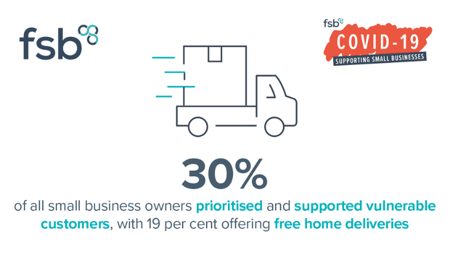
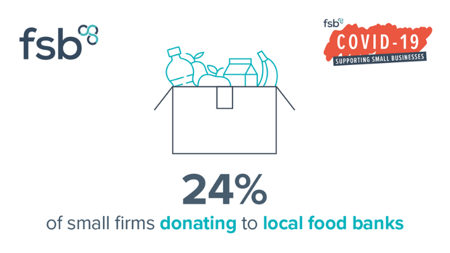
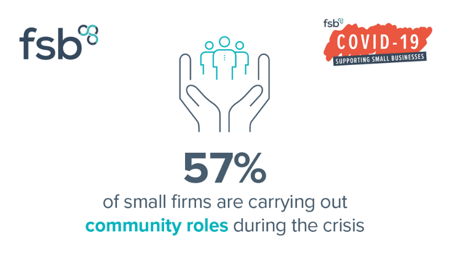
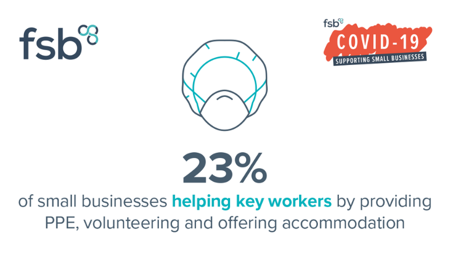
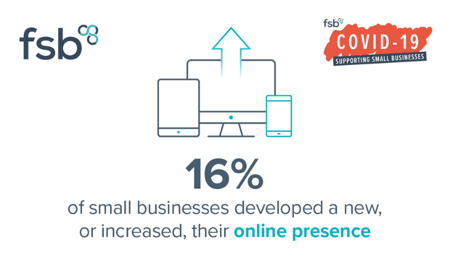
Digital engagement
- 16 per cent of small businesses developed a new/increased their online presence (e.g. social media) including delivering their offering online during the coronavirus lockdown. For those businesses that expect to ‘remain open’ this figure rises to 21 per cent.
- 24 per cent of all small businesses adopted or increased their use of digital technologies (e.g. Zoom, Microsoft Teams) to facilitate working from home. For those businesses that expect to ‘remain open’ this figure rises to 39 per cent.
New services or products
- 10 per cent of all small businesses diversified into producing new services during the lockdown. For those businesses that expect to ‘remain open’ this figure rises to 15 per cent.
- 6 per cent of all small businesses diversified into producing new products/goods during the lockdown. For those businesses that expect to ‘remain open’ this figure rises to 10 per cent.
- 9 per cent of all small businesses started making deliveries to customers’ homes. For those businesses that expect to ‘remain open’ this figure rises to 11 per cent.
Business practices and processes
- 14 per cent of all small business in the UK made structural changes that allow them to keep trading while respecting social distancing. For those businesses that expect to ‘remain open’ this figure rises to 23 per cent.
- 30 per cent of small businesses reported that they altered their business practices to accommodate working from home. For those businesses that expect to ‘remain open’ this figure rises to 41 per cent.
Leadership and management skills
- 51 per cent of small businesses reported that leadership and management skills are most important for the future growth of their business, 34 per cent for product or service innovation and 22 per cent for organisational innovation.
- 53 per cent of small businesses invested in or introduced improvements to working practices and processes, 49 per cent into technology or machinery and 41 per cent into staff training and development over the last year.
- 75 per cent of small businesses report that they set the strategy for their company themselves and 45 per cent report that they determine and execute the strategy depending on their analysis of the business situation.
Recommendations
Small businesses are the backbone of the UK economy and account for 52 per cent of the turnover and 60 per cent of employment in the private sector.They will take any government support they can get to survive the coronavirus crisis and will need help to recover from the expected recession. FSB suggests that the Government considers the following recommendations to help small businesses to recover.
Helping small businesses to support their local communities
- Support local businesses through the Business Improvement Districts to encourage local trading. This would have a significant positive impact on small businesses and their communities and help with the recovery after the coronavirus crisis. The funding announced for the Business Improvement Districts should be used to help smaller businesses to bounce back by delivering services and selling goods locally.
- Local authorities should publish contact details or create an accessible database of local market traders and small businesses if they are available to deliver or sell locally. This would help save businesses with no or little market and help reduce waste. Such a database would be particularly important during emergencies and would help vulnerable individuals to access essential items from within their local communities. Local authorities could also help small businesses to publicise their online services locally in their catchment areas. Many small businesses are willing to deliver products free of charge locally.
- Double down on efforts to ensure public sector procurement is fully accessible to small businesses during the recovery. The demand for Personal Protective Equipment (PPE) and hand sanitiser will remain high for the remainder of the year. If a small firm is in a position to support the national effort by providing PPE that meets all necessary standards, and in sufficient numbers, then public procurement processes need to be accessible to them. The public sector has made important progress in disaggregating large contracts into smaller lots and this work needs to continue at pace.
- Support small businesses to manage employment costs. We have welcomed both the extension of the Job Retention Scheme until the end of October 2020 and the introduction of part-time furloughing from the 1st of August. This will prevent avoidable redundancies and enable small business employers to stagger back the return of furloughed employees. However, it is clear that as we enter into the predicted recession, once the Job Retention Scheme has come to an end, smaller businesses will need further help in relation to employment costs. We welcomed the recent increase in the Employment Allowance from £3000 to £4000. Small business employers will need further help in the upcoming Budget.
- Ensure business support is prioritised in the upcoming Spending Review with urgent engagement on the shape of the UK Shared Prosperity Fund. It is vital that business support in England is revitalised and no longer seen as the poor relation of public policy support. The current crisis will have brought into sharp relief whether there is a sufficiently strong delivery mechanism for the provision of meaningful business support. As we move from the crisis phase towards recovery, it is essential that local authorities, devolved agencies, Local Enterprise Partnerships and local growth hubs have the wherewithal to support small businesses to rebuild and to improve their resilience. For example, this could mean supporting the development of digital skills and the adoption of digital technologies.
- Once the 95% target of non-discretionary funding is allocated, HM Treasury should underwrite any overspend up to a maximum of 5 per cent of that local authorities’ original allocation. Both the Small Business Grant Scheme and the Retail, Hospitality and Leisure Grant Scheme have acted as vital lifelines to small businesses hit hardest by the pandemic. FSB wishes to see local authorities both encouraged to reach the 95 per cent mark of non-discretionary funding allocated, and empowered to use underspend as well as top-up funding to support small businesses struggling in their areas. Local authorities should reach a baseline of 95 per cent allocation, of the number of businesses identified as being eligible for the grants under non-discretionary powers. Once this target is reached, HMT should underwrite any overspend up to a maximum of 5 per cent of that local authorities’ original allocation. This allows local authorities to use their top-up funding, as well as up to 5 per cent of their underspend from their original funds, without fear that they may be left with the costs should those businesses claiming under the original system do so at a later date.
Supporting small businesses with increased digitisation
- Support small businesses who adopted and would like to adopt new digital technologies by widening the definition of ‘R&D’ and introducing digital vouchers for small businesses. Currently there are a plethora of initiatives to support new-to-market innovation such as the R&D tax credit and Innovate UK grant programmes but very little financial support for new-to-firm innovation. The Business Basics Scheme is a step in the right direction but the current crisis requires an intervention of a different order of magnitude. As our research shows new to firm digital innovation will be even more important to enable smaller businesses to adapt to social distancing and to recover. That is why we need to see both a widening of the definition of the scope of ‘development’ within R&D tax credits and the introduction of digital vouchers for smaller businesses seeking to enhance their adoption of digital technologies. On the former the Government announced in March that it would consult on whether expenditure on data and cloud computing should qualify for R&D tax credits. Changes to the tax system are welcome but it is also essential that immediate support is made available to small businesses that need to adopt digital technologies in the here and now.
- Use digital vouchers to help smaller businesses to tackle cybercrime. Cybercrime has emerged as a major threat over the past 20 years because of the exponential growth in the use of digital networked technology. The widespread use of digital networked technologies has increased the vulnerability of many small firms to criminals who – with ever-growing sophistication – are exploiting the weaknesses in common technologies and the lack of knowledge/experience of those operating them. There are concerns that the coronavirus crisis will increase the number of cyber-attacks on small businesses. FSB research shows that around one in five (20%) smaller firms across England and Wales say they were victims of cybercrime at least once in the previous two years. Of those smaller businesses that experienced cybercrime in the previous two years, the most frequently-reported types are: phishing – including spear phishing (51%), malware (36%) and processing fraudulent payment online (29%).
- Support small businesses that trade on online platforms. Many businesses moved to operating online over trading platforms during the coronavirus lockdown. The Government should support small businesses by closely examining the practices and policies of platforms towards their small business users and rectifying current barriers, for example, in relation to fake reviews. It should also address the issue of fair competition across digital platforms, with the CMA reporting an exponential increase in reports of price hiking on online platforms with some suspicion that this has also occurred in supply chains. FSB research found that small firms suffered from malicious or fake reviews (20%), sudden changes to terms and conditions (19%), and infringement of intellectual property (13%) when trading over online platforms. Increased online trading due to the lockdown will exacerbate these challenges. The recent developments on fake reviews in response to the work carried out by the Competition and Markets Authority is welcome but more needs to be done.
- Deliver full fibre connectivity to all premises as soon as possible given the new circumstances or gigabit capability if that is not possible in some of the most remote areas and accelerate the planned increase in mobile coverage. Smaller firms struggle with poor broadband and mobile connectivity. Prior to the outbreak, FSB research found that 41 per cent of small businesses reported that their broadband is often unreliable and almost half (47%) of small businesses said that they experience unreliable mobile data connectivity. This is worse in rural areas where 39 per cent of small businesses consider their broadband speeds to be insufficient for their current needs. The Government, industry and regulators should work together to deliver full fibre connectivity to all premises as soon as possible. If that is not possible in some of the most remote areas, those premises should be made gigabit capable, which widens the scope of technologies available to achieve such a connection. This is especially important in light of the increase in the number of small businesses operating online.
Helping small businesses to foster economic growth
- Allow a greater regulatory freedom for small businesses to stimulate economic growth and help businesses to innovate. A more flexible regulatory framework fosters and stimulates innovation. The regulatory sandbox created by the Financial Conduct Authority allowed new products and services to come to market. Similar to the sandbox, but not necessarily regulator-led approaches could be adopted to give small businesses a greater regulatory freedom to innovate. Such initiatives could help entrepreneurs to start new firms, invest in R&D or create new products much quicker.
- Help new firms to start by encouraging change in institutional culture and perception of insolvencies and administration and incentivising the unemployed to become self-employed. Helping new firms to start will be essential given that crisis will negatively affect entrepreneurs’ appetite for risk. The Enterprise Research Centre analysis found that there has already been a drop-off in the number of business starts and the number of firms going out of business in March 2020 was 70 per cent higher than in March 2019. Many entrepreneurs will struggle to restart their lives, take loans and start new businesses. The government should encourage and incentivise the unemployed through regulation, taxation and access to external finance to become self-employed. Change of culture and perception around insolvencies and administration at institutional level would allow individuals to bounce back with the help of financial organisations. The government should seek to change this to embolden entrepreneurs to start new businesses without the fear of failure.
- Quickly implement provisions within the Corporate Insolvency and Governance Bill, currently passing through Parliament, to help small firms that find themselves in financial distress and at risk of insolvency. Legislative measures such as the moratorium against insolvency procedures, the temporary suspension of statutory demands and wind-up petitions and the suspension of wrongful trading provisions will help smaller businesses in the precarious stages of early recovery.
- Enable smaller firms to reskill, retrain and upskill their workforce through the National Skills Fund. Helping small businesses with reskilling, retraining and upskilling their staff quickly will be important for rapid economic growth. The government must support small businesses through the National Skills Fund and allow the workforce to quickly acquire new skills, including digital skills. It could be delivered through a digital platform linked to digital accounts with allocated funding for small businesses. The government could target the sectors that have struggled the most during the crisis and those who have been made redundant across such sectors.
- Support small businesses to hire young people with joint apprenticeships and employment schemes. Research shows that young people leaving education will be substantially impacted and will struggle to find a good-quality work in the current labour market. The government should consider offering joint apprenticeships for young people whereby two employers could come together to employ an apprentice each paying one of half of the apprentice’s wage. This would be especially important in light of the sharp reduction in the number of apprenticeship starts and completions and decline in training provision. The government could also offer employment schemes that pay the wages of young people (16-24 years old) for the first three to six months of their employment.
Download the full report



